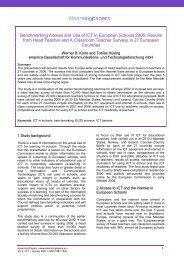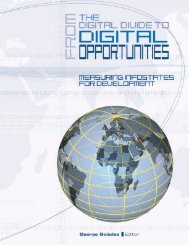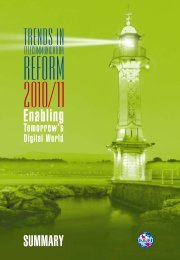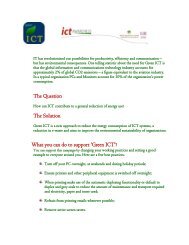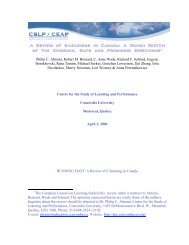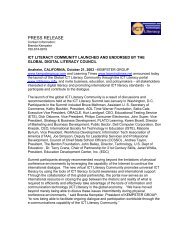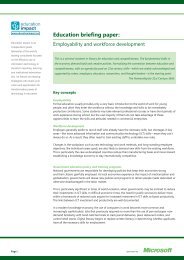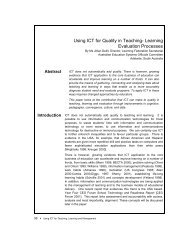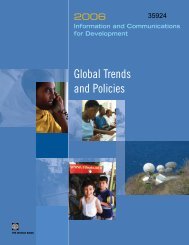The Digital Opportunity Index (DOI) - ITU
The Digital Opportunity Index (DOI) - ITU
The Digital Opportunity Index (DOI) - ITU
Create successful ePaper yourself
Turn your PDF publications into a flip-book with our unique Google optimized e-Paper software.
Statistical Chapter Three Annex<br />
Figure 3.4: <strong>The</strong> New Substitution<br />
Top economies by total number of Internet<br />
subscribers, in millions, 2005<br />
Type of Internet connections in the United Kingdom,<br />
total in millions, 2001-2006<br />
Taiwan, China<br />
Australia<br />
India<br />
Spain<br />
Netherlands<br />
Brazil<br />
Canada<br />
Italy<br />
Korea (Rep.)<br />
France<br />
United Kingdom<br />
Germany<br />
Japan<br />
China<br />
United States<br />
5.9<br />
6.0<br />
6.1<br />
6.2<br />
6.6<br />
7.2<br />
7.5<br />
11.0<br />
12.2<br />
13.3<br />
16.2<br />
24.0<br />
30.1<br />
Broadband<br />
15<br />
Narrowband<br />
11.9 12.0<br />
11.4<br />
Total number of Internet 10<br />
subscribers 9.3<br />
73.2<br />
83.1<br />
5<br />
0<br />
0.3<br />
1.4<br />
3.2<br />
6.2<br />
Dial-up<br />
Broadband<br />
2001 2002 2003 2004 2005 2006<br />
6.4<br />
10.0<br />
11.1<br />
6.0<br />
Source: <strong>ITU</strong>/UNCTAD/KADO <strong>Digital</strong> <strong>Opportunity</strong> Platform (left chart); OFCOM (UK), “<strong>The</strong> Communications Market<br />
2006”, at: www.ofcom.org.uk/research/cm/cm06/ (right chart). See also Table 10 in the Statistical Annex.<br />
<strong>The</strong> top 25 economies in the <strong>DOI</strong> have been<br />
remarkably stable over the period 2004-2006.<br />
Indeed, the only economy to drop out of the top<br />
twenty-five was Slovenia, replaced by Estonia<br />
(studied further in Chapter four, Section 4.2.2).<br />
Rankings within the top twenty-five are consistent<br />
(suggesting the index is robust), with generally<br />
changes of only a few places up or down – the<br />
only exceptions are the United Kingdom (which<br />
rose eight places due to strong gains in broadband,<br />
with subscribers renouncing their dial-up<br />
connection – see Figure 3.4, right chart), and<br />
Canada (which falls seven places, due to its relatively<br />
weak cellular mobile penetration). Mauritius<br />
is the highest-ranking African economy, at 59 th .<br />
Chile remains the highest-ranking Latin American<br />
country at 41 st , followed by Argentina at 54 th . <strong>The</strong><br />
Gulf States continue to do well (including Bahrain<br />
at 35 th place, the United Arab Emirates in 37 th rank<br />
and Qatar in 38 th rank), as do the Caribbean and<br />
other small island states.<br />
Evolution in Internet subscriptions depends on<br />
both growth in the total size of the market, as well<br />
as the speed (quality) of connections. 2005 was a<br />
year of startling Internet growth in many countries,<br />
thanks to the boost from broadband, although<br />
the United States still remains the largest Internet<br />
market in terms of number of subscribers (Figure<br />
3.4, left). Growth rates in Internet subscriptions are<br />
lower in high-<strong>DOI</strong> economies, but substitution is<br />
strong, with subscribers exchanging narrowband<br />
dial-up for a broadband connection. One example<br />
is the substitution of broadband for dial-up in the<br />
United Kingdom (Figure 3.4, right). In the United<br />
States, some 60 per cent of all Internet connections<br />
are now broadband, while in Japan and<br />
Spain, efforts by operators to encourage consumers<br />
towards broadband have resulted in threequarters<br />
of Internet subscribers now using broadband.<br />
In the Rep. of Korea and Canada, virtually all<br />
Internet users are already broadband subscribers<br />
and enjoy access to faster, advanced services such<br />
as video, teleconferencing, multiplayer gaming<br />
and triple play. Substitution of broadband for dialup<br />
has also been observed in Qatar, where broadband<br />
now accounts for two-thirds of all Internet<br />
accounts. 8<br />
3.3.2 Economies with Medium <strong>DOI</strong> scores<br />
(0.30-0.49) – Rounded growth<br />
<strong>The</strong> group with medium <strong>DOI</strong> scores comprises<br />
diverse economies from Latin America and the<br />
Caribbean, Asia and North Africa. Notably, it<br />
includes the developing country giants of China,<br />
Brazil, Egypt and Indonesia, as well as India, which<br />
joins the medium-<strong>DOI</strong> countries for the first time<br />
in this year’s release of the <strong>DOI</strong>. It also includes<br />
the upper-middle income African states of South<br />
Africa, Botswana and Gabon, as well as Namibia<br />
and Senegal (Box 3.1). Non-OECD European countries<br />
generally also have medium-<strong>DOI</strong> scores (e.g.,<br />
Albania, Belarus, Bosnia and Ukraine). China and<br />
the Maldives are the highest-ranked developing<br />
countries from Asia in the group. Medium-<strong>DOI</strong><br />
countries have high average <strong>Opportunity</strong> at around<br />
0.89, due to good mobile coverage and relatively<br />
low prices. What distinguishes this group from the<br />
low-<strong>DOI</strong> economies is their reasonable infrastruc-<br />
42



